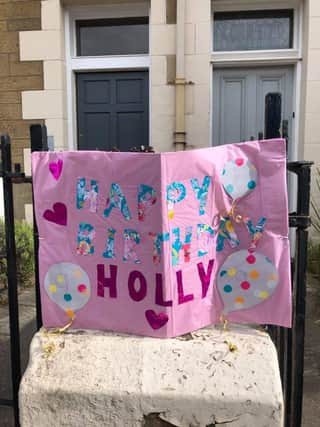People feel 'increased sense of community' due to Coronavirus


With communities coming together weekly to Clap for Carers and networks of volunteers helping out vulnerable members of their communities, lockdown has led to people feeling closer to those around them, the study said.
Meanwhile, a further third say they feel an increased sense of pride in their home since they have been forced to spend more time in it.
Advertisement
Hide AdAdvertisement
Hide AdPeople living in detached houses have felt the greatest increase in ties to their community and neighbours, followed by those in semi-detached houses, bungalows, terraced houses and flats or apartments, where only just over a quarter feeling increasingly close to their neighbours.
People aged 55 and over are also more likely to have noticed an improved sense of community, compared to the younger generation of those aged 18 to 24.
Ruth Jays, who lives in Edinburgh with her husband and two daughters, Eilidh, 11 and Holly, nine, has found the crisis has created a strong sense of community on their street.
She said: “We live on a main road and while we know our neighbours on either side prettty well, we didn’t really know the others. When lockdown began, someone started a WhatsApp group. My daughter, Holly, was one of the first lockdown birthdays at the beginning of April. I posted a message on the group saying it would be nice if people could put some balloons out for her - and that I had some if people wanted to collect them.
“Then on the day, a neighbour asked what time we’d be going out for our walk. While we were out, they decorated the whole street with bunting, balloons and banners. Holly was overwhelmed. People came out into their gardens to wave to her as we came back.”
She added: “Our other daughter, Eilidh, has started a newsletter for the street and people have been great, sending in things for her to use. I do feel we have got to know our neighbours a lot better and it has brought us together in a way that wouldn’t have happened if it wasn’t for Coronavirus.”
The study also found that whilst the type of home has been no barrier to adorning windows with rainbows, and other cheerful decorations for the NHS, almost a fifth of Brits surveyed for Halifax, in partnership with YouGov, are seeing out lockdown in a flat, and a further fifth in a terraced house. In addition, whilst many are waiting out lockdown in a property with three bedrooms, almost a tenth only have one. A further six per cent are living in a property with a spacious five bedrooms or more.
Russell Galley, managing director of Halifax, said: “Lockdown will have been a difficult time for many, particularly for the one in 10 who don’t have access to outdoor space.
Advertisement
Hide AdAdvertisement
Hide Ad“However, it’s cheering to see that almost a third of people feel more positive about their home following lockdown, and a greater sense of community with their neighbours, a testament to our ability to keep optimistic, and come together, in the face of challenging circumstances.”
This positive trend is seen despite two thirds of those surveyed living through the Covid-19 lockdown in a home without a dedicated space to work or study, rising to 70 per cent for those under 25.
Some people are also living with minimal, or no, outdoor area of their own, with almost a tenth seeing out lockdown in a property with no outside space or garden. A further 14 per cent either share a garden or outdoor space or have a balcony or terrace.
However, most people, say they have no plans to move from their current property, post lockdown. Those in bungalows are most inclined to stay put, compared to 75 per cent in semi-detached properties, 71 per cent in terraced houses, and 53 per cent of those in flats and apartments.
Of the very small number who were planning on moving, but have since reconsidered, the most common reason is due to a change in financial circumstances, whilst over a fifth have fallen back in love with their property, after spending an increased amount of time in it over the past months.
For those who are planning on pushing ahead with a move when possible, the main driver was needing more space, whilst over a fifth said spending so much time at home had made them see faults with their current property.
When asked more generally about moving, UK adults agreed indoor and outdoor space would be the main factors in making them want to move, and almost a tenth said they would like to move to a less populated part of the country.
A message from the Editor:Thank you for reading this story on our website. While I have your attention, I also have an important request to make of you.With the coronavirus lockdown having a major impact on many of our advertisers - and consequently the revenue we receive - we are more reliant than ever on you taking out a digital subscription.Subscribe to scotsman.com and enjoy unlimited access to Scottish news and information online and on our app. With a digital subscription, you can read more than 5 articles, see fewer ads, enjoy faster load times, and get access to exclusive newsletters and content. Visit https://www.scotsman.com/subscriptions now to sign up.Our journalism costs money and we rely on advertising, print and digital revenues to help to support them. By supporting us, we are able to support you in providing trusted, fact-checked content for this website.Joy YatesEditorial Director